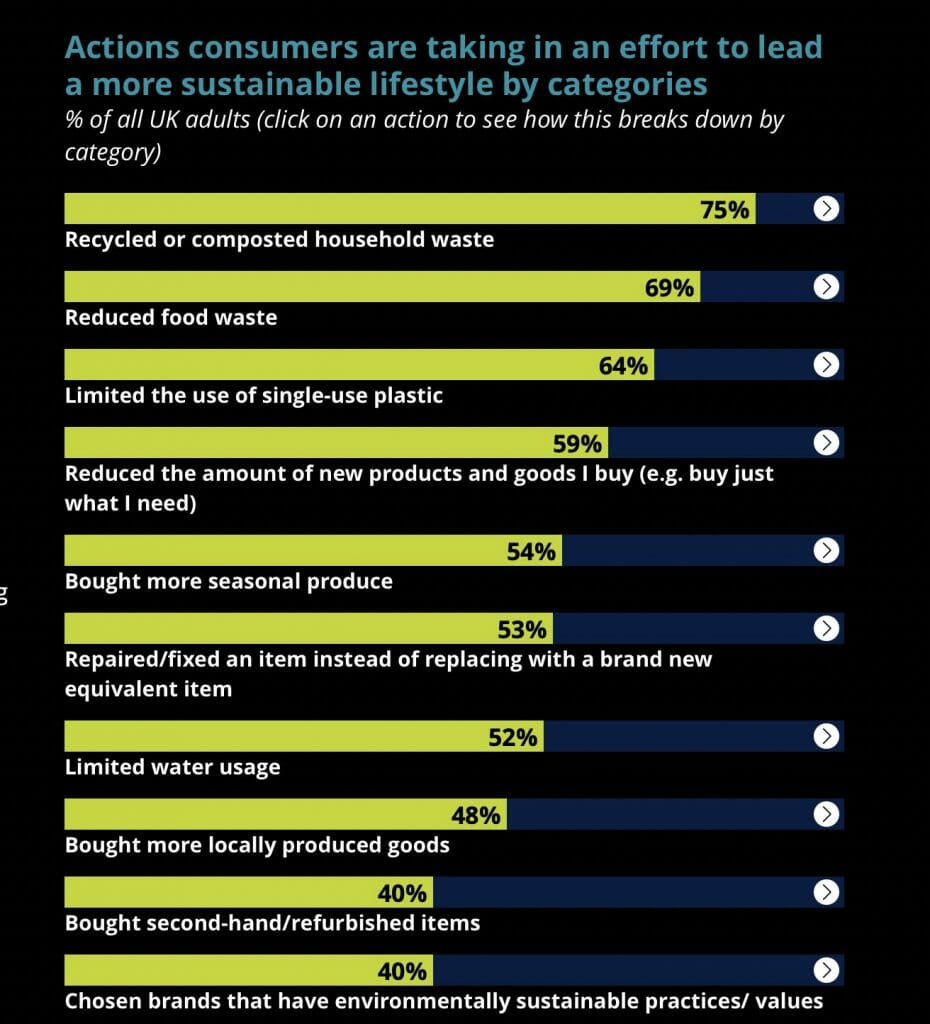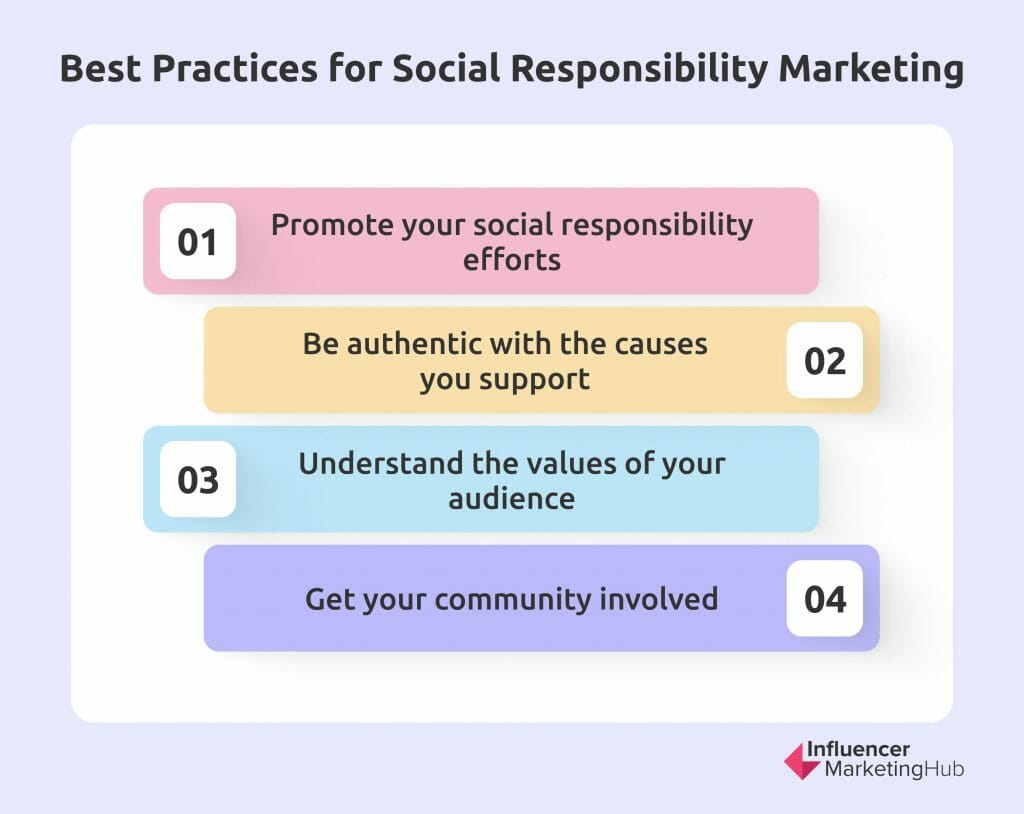Consumers love to support brands that care. In fact, 71% of consumers in a Sprout Social survey said that it’s important for brands to take a stand on social issues. No wonder social responsibility marketing has become such a major focus for global brands and small businesses alike.
In this post, we take a closer look at what social responsibility marketing is and provide you with a few excellent examples. We also list some of the best practices to help you get started.
Social Responsibility Marketing:
What is Social Responsibility Marketing?
Social responsibility marketing is an approach to marketing where you try to attract consumers who want to support a cause or make a positive change with their purchasing decisions. It involves promoting your corporate social responsibility (CSR) efforts such as making donations, volunteering for a cause, maintaining ethicality, following sustainable practices, supporting communities, and many more.
What Is Corporate Social Responsibility (CSR)?
Corporate social responsibility refers to the business model that a company follows so that it can remain socially accountable–whether it’s to stakeholders or to the public. It enables companies to be conscious about the impact that they have on the environment, economy, and society. Essentially, CSR helps brands to make choices that are morally and ethically correct.
Why Do You Need Social Responsibility Marketing?
The rise of the socially conscious consumer is leading to an evolution in the marketing landscape. Brands not only have to make ethical and morally conscious choices, but they also need to actively express those choices to show consumers what their values are. The goal is to attract consumers whose values align with theirs.
This is becoming more important than ever as consumers increasingly want to support socially conscious brands. According to a 2021 SurveyMonkey study, 46% of respondents cared much more about social values than they did a year prior. As expected, 78% of respondents were making purchase decisions based on their values. Moreover, 55% also said that they were much more likely to choose companies whose values aligned with theirs.
Sustainability and eco-consciousness are among the biggest concerns for consumers today. As a result, 40% of respondents in a Deloitte survey were also choosing brands with environmentally sustainable practices or values. In fact, 38% were even willing to pay extra for products that were more durable and longer lasting. Additionally, 37% were also choosing brands with ethical practices and values.
Not surprisingly, 34% of survey respondents had even stopped buying certain brands or products because of ethical or sustainability concerns. It’s clear that consumers are becoming increasingly conscious about leading ethical and sustainable lifestyles. Brands need to adapt by aligning their marketing approach to address those concerns.
10 Examples of Social Responsibility Marketing
Thinking of incorporating social responsibility into your marketing strategy but not sure how to get started? Get inspired by these 10 brands who are doing it right.
1. Tentree
As a brand that’s big on sustainability, Tentree’s no stranger to social responsibility. The brand understands that their customers are highly conscious about their buying choices and how they impact the environment. To address these concerns, Tentree introduced Climate Plus, a subscription plan that would allow customers to plant trees and offset their carbon footprint.

Source: tentree.com
Customers can choose a one-month plan to offset the lifestyle of an average Canadian by planting 13 trees. Or they can choose the Family Tree, which would offset the lifestyle of a family of four in Canada by planting 22 trees a month. They also offer several family offset packages, travel offset packages, daily offset packages, and events offset packages for customers to choose from.
By allowing their customers to easily offset their carbon footprint, Tentree effectively addresses a major pain point. It also establishes the brand as a leader in the sustainability front, helping them win the trust and loyalty of many eco-conscious customers.
2. Fenty Beauty
Fenty Beauty keeps it simple with their social responsibility marketing by maintaining transparency about their earth-conscious initiatives. The brand has a dedicated page on their website explaining the actions they’re taking to reduce the impact of their products on the environment. They explain how they’ve eliminated boxes wherever possible and chosen recyclable materials even for the protective paper boxes they still use.
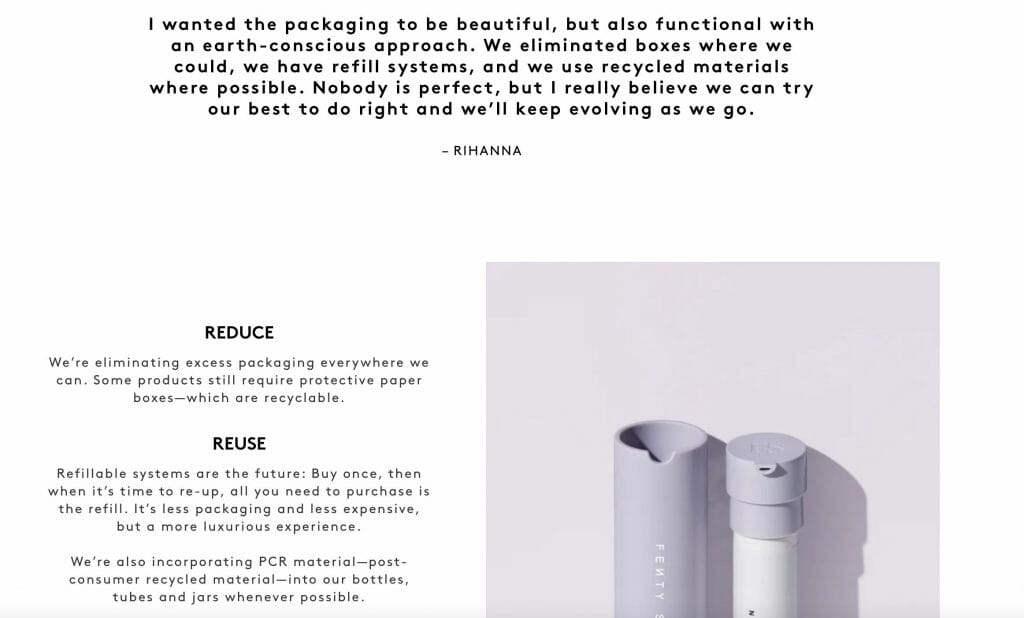
Source: fentybeauty.com
The brand implements refillable systems, so customers only have to buy the refill if a product runs out. This not only costs less for the customer but also requires less packaging, which minimizes the environmental impact. By stressing these initiatives, Fenty Beauty gives customers peace of mind to buy their products since their impact on the environment will be less.
3. Trupanion
Trupanion is a pet insurance company that actively tries to make a positive change for pet owners and pets in general. For instance, the brand partnered with We Rate Dogs on Twitter to bust the harmful myths about pit bulls. They also regularly share helpful tips and information about pets to educate and spread awareness.
Recently, Trupanion organized a fundraiser called Paws for Ukraine with the goal to help the people and pets of Ukraine. With the funds collected, they’ve helped to provide access to pet food, reconnect pet owners with their lost pets, and send medication and pet supplies to the people of Ukraine. Through this initiative, Trupanion establishes themselves as a brand that truly cares about the well-being of animals and offers support to pet owners.
We're thrilled to announce a #PawsForUkraine update! We have raised over $238,000 and proudly made donations to organizations serving the people and pets of Ukraine. Thank you to all who have supported our cause-driven support initiative! Learn more: https://t.co/VNqMueVGPv pic.twitter.com/c4gTYzCjOi
— Trupanion (@Trupanion) August 21, 2022
4. Fabletics
Fabletics is an activewear brand that’s big on inclusivity, choosing to feature real women of all shapes and sizes on their social media. However, the brand’s initiatives don’t just end at this. They also make an active effort to bring a positive change by speaking out about social issues such as hatred targeted toward Asian communities. Moreover, Fabletics also regularly makes donations to organizations and causes focused on these issues.
The brand has also helped to raise awareness about breast cancer by partnering with a relevant organization. They even launched a collection for this cause, where 100% of the net proceeds of up to $25,000 would be donated to the organization. Furthermore, Fabletics promotes all these social responsibility initiatives through a dedicated Instagram Story Highlights category titled “Our Impact.”

Source: instagram.com
5. Zoom
Consumers aren’t just looking at what materials you use or what impact your products have on the environment. They’re also looking at how you treat the people behind your brand to determine whether you really care. Knowing this, Zoom is extremely dedicated to building a strong employer brand as it plays a crucial role in social responsibility marketing. In 2021, the company was even ranked one of the Best Places to Work by Glassdoor.
Zoom uses the “Life” tab of their LinkedIn to highlight the company culture. They explain their commitment to delivering happiness and the benefits they offer to help employees maintain work-life balance. Here, they stress the various health benefits they offer and the generous vacation policy to show how much they care about their employees.
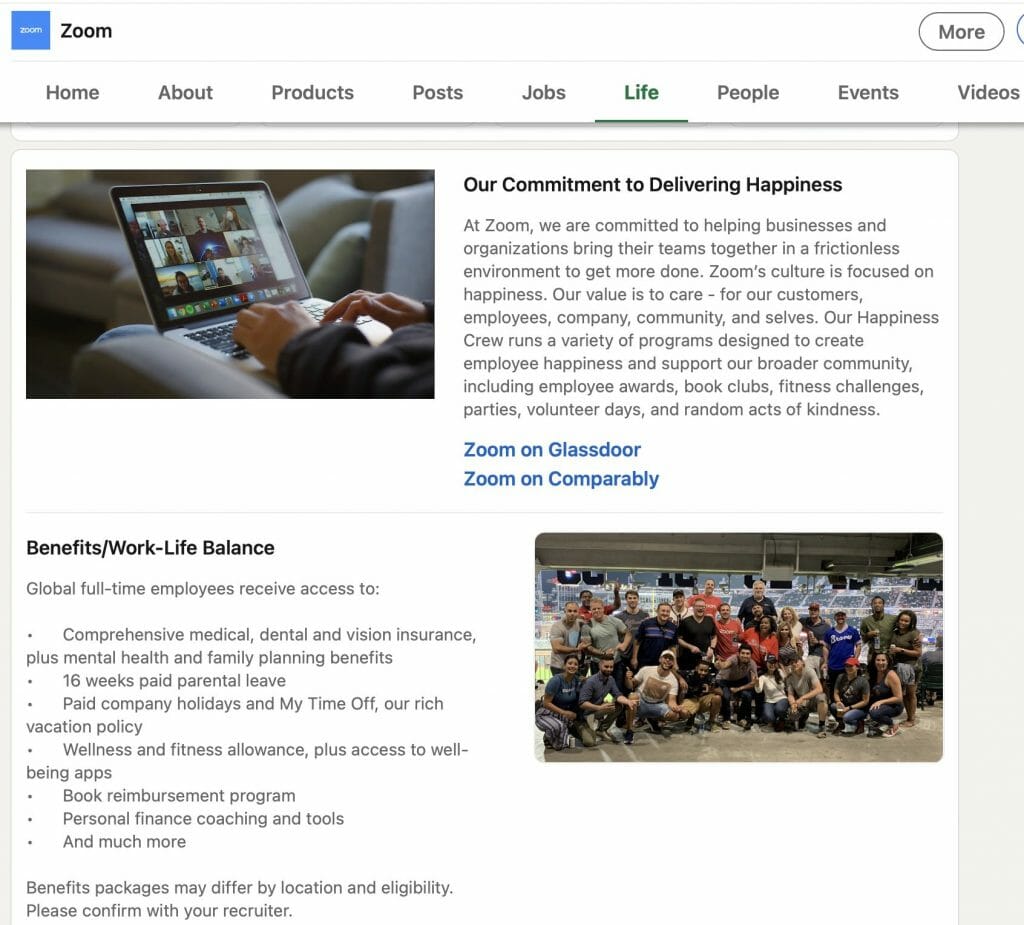
Source: linkedin.com
6. Wendy’s
Wendy’s may be known for their snarky Tweets and their sick burns, but the fast-food chain doesn’t shy away from social responsibility either. Although the brand doesn’t publicize it as much on platforms like Twitter and Instagram, they regularly support social causes and share the news on LinkedIn.
For instance, they shared how they partnered with the Columbus Women’s Commission to work toward achieving pay equity. They’ve even been organizing an annual Frosty 5K Run for Adoption, where they donate 100% of the registration fees to the Dave Thomas Foundation for Adoption.
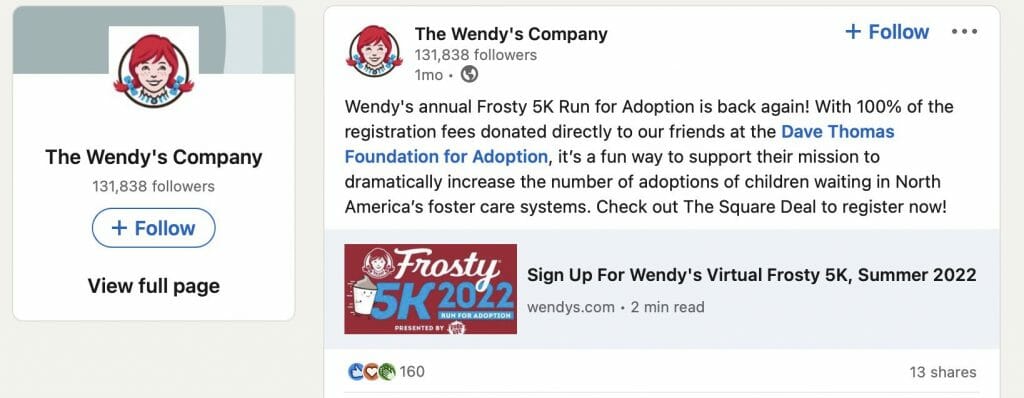
Source: linkedin.com
These initiatives show that behind the snarky and sarcastic identity that’s commonly associated with Wendy’s, the company still cares about the serious stuff. They still take a stand when it comes to important social issues, which establishes them as a brand with values.
7. Oracle
Oracle is committed to enabling sustainability, with the goal to help their customers run their businesses with less energy use. They even have a sustainability plan in place, which allowed them to recycle and reuse 99.6% of retired hardware during 2021 alone. The company is also targeting 100% renewable energy use by 2025 and plans to achieve net zero emissions by 2050.
For Earth Day 2022, Oracle shared an Instagram post to showcase how much of a difference they’ve made. The short video highlighted how their take-back and recycling programs have saved 33,000 metric tons of CO2 from entering the atmosphere. It also helped the audience to visualize what this meant in terms of vehicle use and energy use at home. This established Oracle as a company that cares about their impact on the environment.
8. Canva
As a brand that’s big on diversity and inclusivity, Canva actively supports artists coming from diverse backgrounds. They introduced the Canva Represents Fund to provide funding for artists in underrepresented communities. The goal is to support them in creating content that represents everyone, allowing the company to build a more diverse and inclusive content library.
Content created by these Canva Represents artists are then made freely available to use by Canva users. By championing artists from underrepresented communities and creating a more diverse content library, the company establishes their commitment to diversity and inclusivity.
Artists like Sophie are helping us build a more diverse and inclusive free content library, supported by the Canva Represents Fund.
"I was inspired by the little whimsical animations and retro designs that remind me of my childhood.” - Sophie Kietzmann, Canva Represents Artist. pic.twitter.com/WcxD1dO27Z
— Canva (@canva) September 1, 2022
9. Notion
Notion puts their values into action through several approaches. To foster a diverse and inclusive workplace, the company encourages several employee-led affinity groups such as Accessibility at Notion and Immigrants at Notion. The company also shows their support for important social causes by offering 50% off their team plan to 501(c)3 organizations.
Further amplifying their social impact, Notion also runs several programs and partnerships for promoting diversity, equity, inclusion, and antiracism. This includes supporting organizations like 826 Valencia to help students from under-resourced backgrounds in finding their voice as writers and artists. BreakLine is another organization they support, which allows them to reach veterans, women, and POC who are trying to start a career in tech.
Notion displays their social impact on their Careers page, which allows them to effectively market their employer brand. This helps them to attract employees whose values align with theirs and build a socially conscious community within the organization.
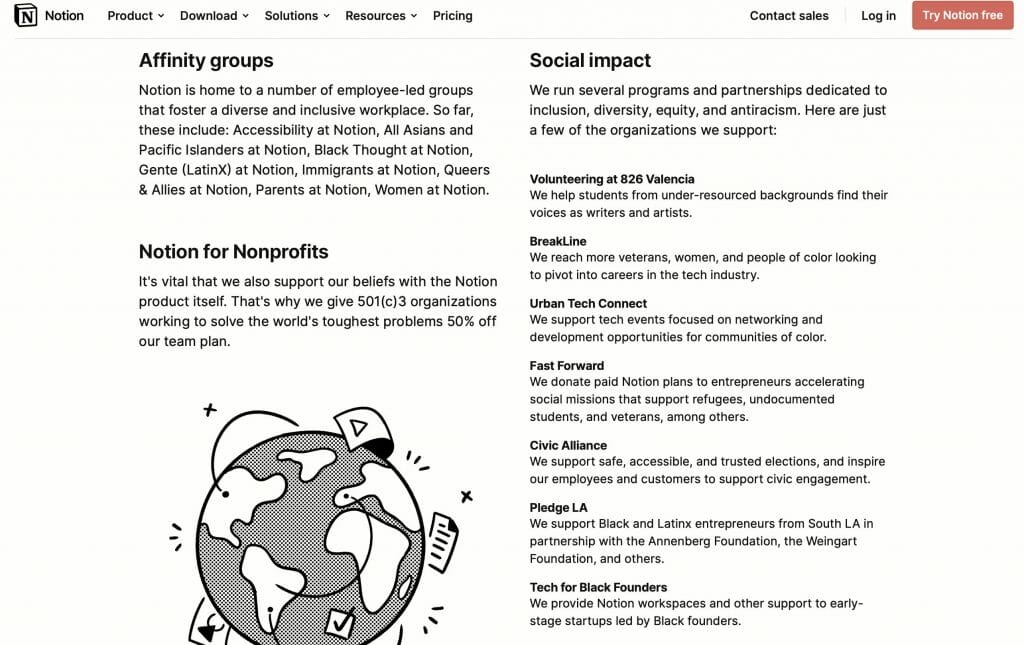
Source: notion.so
10. Tesco
Tesco’s food division has been actively supporting several important social causes and promoting these initiatives through Instagram. This includes partnering with an influential cancer advocate to raise awareness about the signs and symptoms of bowel cancer and making donations to the Bowelbabe Fund.
The brand has also organized Food Collection events to help families who are experiencing economic hardships. Tesco shared an Instagram post encouraging followers to donate and support their Food Collection. They also pledged to add an extra 20% in cash for every item donated. These types of initiatives are great for establishing Tesco as a company that cares about local communities.
4 Best Practices for Social Responsibility Marketing
Now that you have some excellent examples to replicate, you’re probably excited about starting your own social responsibility marketing initiative. Here are a few best practices to keep in mind.
Promote your social responsibility efforts
Although you may be slightly hesitant to announce your good deeds, the whole point of social responsibility marketing is to promote your socially conscious initiatives. The idea is to attract like-minded consumers and employees with your socially responsible values and actions. So, it won’t make too much sense if you’re keeping your target audience in the dark.
Don’t hesitate to market your social responsibility initiatives when it’s appropriate. Even if you’re not constantly sharing news about the positive changes you’ve made, don’t miss relevant occasions and holidays to talk about it. For instance, in one of the above examples, Oracle shared an Instagram post on account of Earth Day to promote the environmental impact that their initiative has made.
Be authentic with the causes you support
If there’s one thing consumers like more than socially conscious choices, it’s authenticity. They know which brands are using Pride Month only as a marketing opportunity and which ones are truly inclusive of the LGBTQ+ community throughout the year. Similarly, they know which brands are using sustainability and ethicality only as a façade while exploiting workers. In other words, they can tell when you’re authentically supporting a cause and when you’re doing it just for marketing.
As such, be very mindful to support causes that authentically align with your brand values. Although social responsibility marketing is marketing, the idea is to market the social responsibility initiatives that you truly believe in. Basically, you’re not doing it just for marketing. That means if you’re showing your support for the LGBTQ+ community during Pride Month, your company culture should also be safe and inclusive for the community.
Understand the values of your audience
What does your audience believe in? What causes do they support? Since the goal of social responsibility marketing is to improve your appeal to consumers (or prospective employees), you have to think about what causes are close to the hearts of your target audience. You can then find the right balance between the causes that align with your brand values and the values of your audience.
For example, Just Food for Dogs aims to provide dogs with life-changing nutrition through fresh food. So, their target audience is made up of people who love dogs. The brand decided to partner with We Rate Dogs to donate their Pantry Fresh products to shelters and rescues–a cause that their target audience would support.
In February we were able to provide large donations of our Pantry Fresh products to many rescues and shelters throughout San Diego and Los Angeles counties.
The @dog_rates team collaborated with us to get this food into the paws of rescue pets in need. pic.twitter.com/TdTTRI1rOV— JustFoodForDogs™ (@JustFoodForDogs) March 15, 2022
Get your community involved
One way to effectively market your social responsibility initiatives without sounding overly self-promotional is by getting your community involved. Encourage followers to share your post with their followers to help raise awareness about a particular cause. Or ask them for donations where you lead by donating a significant amount or by matching their donations.
That way, you’re publicly sharing your support for the cause without blatantly promoting your brand. Moreover, you could generate a bigger impact by getting your community involved, resulting in increased awareness and even larger donations.
Ready to Get Started?
We’ve provided you with ideas and best practices that will help you nail your social responsibility marketing. Make sure to keep authenticity at the center of your efforts and use your brand values to guide your initiatives.
Frequently Asked Questions
What is meant by social responsibility?
Social responsibility is the belief that organizations and individuals alike have a responsibility to act in the best interests of society.
What are the four types of social responsibility?
The four main categories of social responsibility are related to environmental, ethical, economic, and philanthropic responsibility.
What is meant by social responsibility marketing?
Social responsibility marketing is an approach to marketing where you promote your socially responsible initiatives to attract consumers who want to support a cause or make a positive change with their purchasing decisions.
Is CSR a marketing strategy?Is CSR a marketing strategy?
CSR is a business model that a company follows so that it can remain socially accountable. While it’s not necessarily a marketing strategy, it can be incorporated into your marketing strategy.
How important is social responsibility to consumers?
Consumers are becoming much more socially conscious and, therefore, place significant importance on social responsibility.
